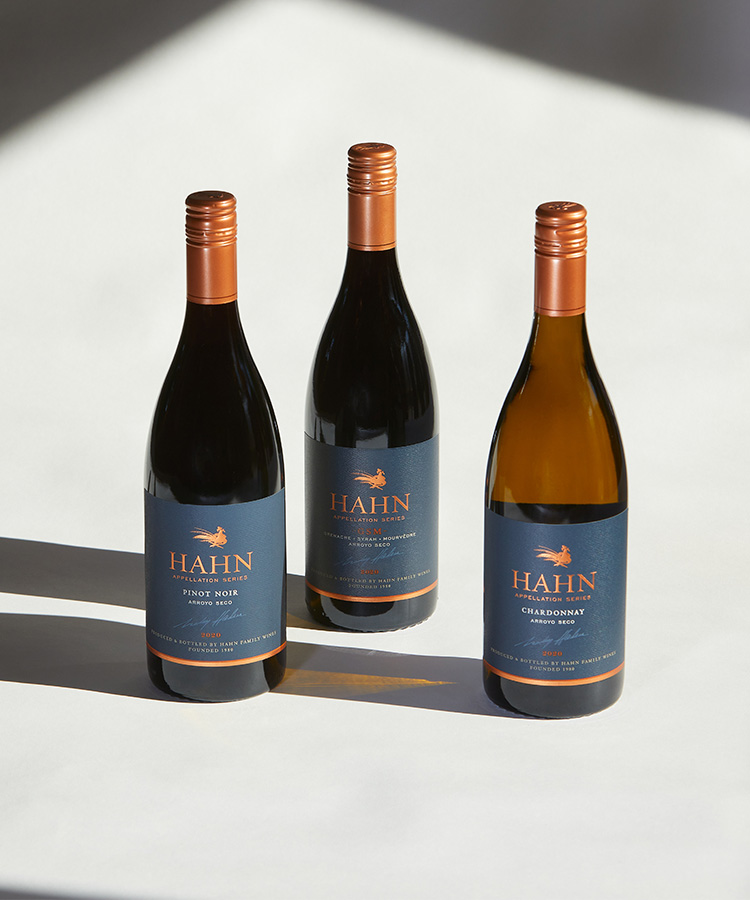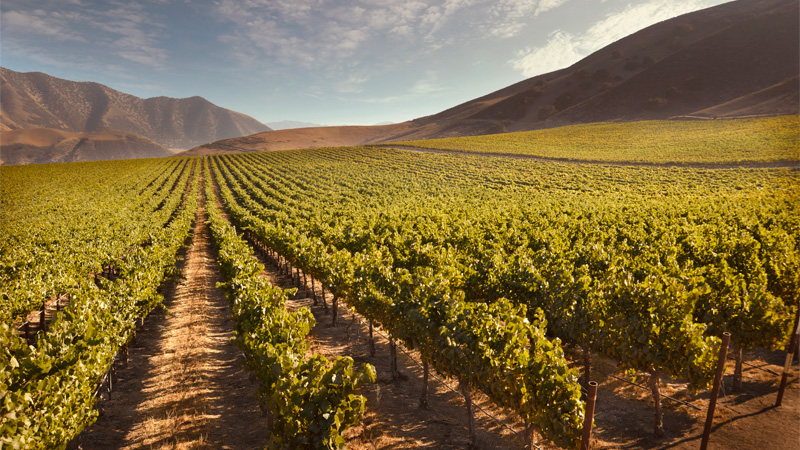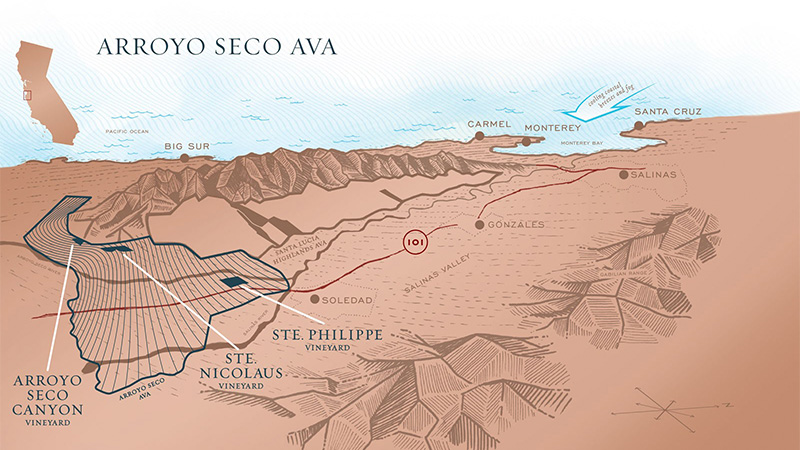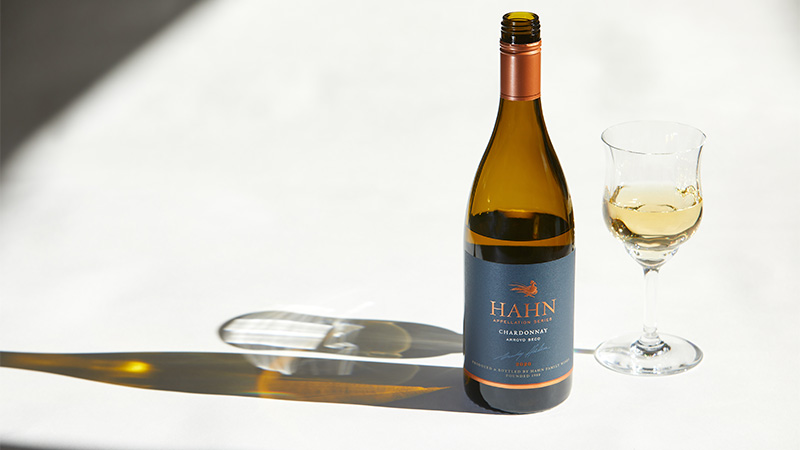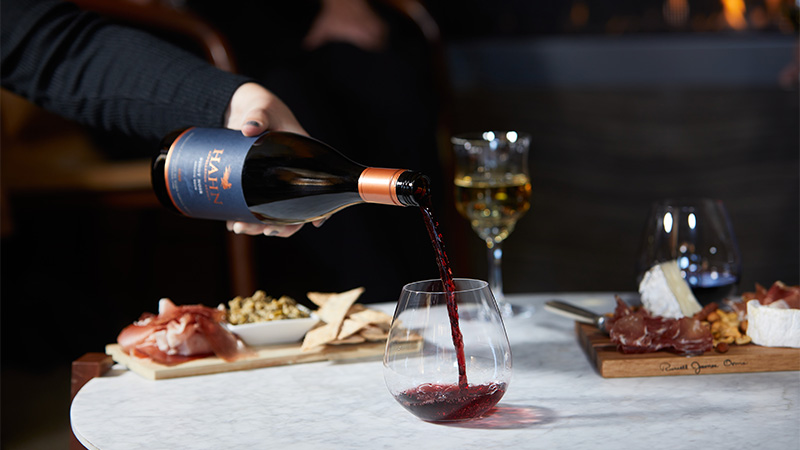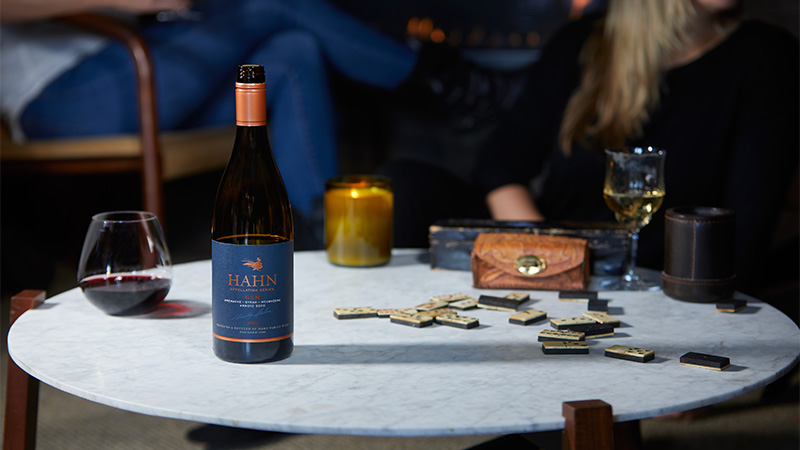
With a potent background in international business, a deep passion for wine, and a knack for seeing great potential in undiscovered terroir, Nicky Hahn knew he was onto something great when he first moved to Monterey, Calif. In the late 1970s, Nicky and his wife Gaby purchased former horse and cattle ranches that had been recently planted to grape vines on the Santa Lucia Highlands benchlands above Salinas Valley. The Swiss-born couple cemented the future of the area when, under Nicky’s visionary leadership and hard work with neighbors, the Santa Lucia Highlands was awarded AVA status in 1991.
Since those early days, the Hahn family cultivated a reputation for producing wines of exceptional depth and character. Hahn Appellation Series is their latest installment in the quest for quality family winemaking, showcasing all the Arroyo Seco AVA can offer.
The Appellation Series: How the Hahn Family Showcases Arroyo Seco AVA Character and Complexity
Sourced from Ste. Philippe and Ste. Nicolaus estate vineyards in Arroyo Seco, one of California’s smallest and most undiscovered AVAs, the Hahn Appellation Series epitomizes not just California wine, but also a family legacy as quiet rule breakers. Always innovating in matching grape varieties to soil and climate, the Arroyo Seco series highlights Hahn’s skill at exploring each AVA and celebrating its attributes through each wine. In this series, the wine drinker will discover the personality of Arroyo Seco through the Chardonnay, Pinot Noir, and a Grenache, Syrah, and Mourvèdre (GSM) blend.
“These wines provide a new product to the consumer with similar characteristics of our wines they already drink, but with a very distinguished and nuanced personality,” Juan José Verdina, winemaker at Hahn Estate, tells VinePair. “Chardonnay and Pinot Noir consumers have a working knowledge of California AVAs. We want to show them that there are great AVAs producing fantastic wines they simply don’t know yet.”
Arroyo Seco Vineyards
Ste. Nicolaus and Ste. Philippe vineyards – named for their sons, Nicolaus Jr. and Philip – were planted in 1994 and are located at opposite ends of the Arroyo Seco AVA. The Ste. Philippe vineyard, located on Arroyo Seco’s “Ancient Riverbed,” is exposed directly to the rippling afternoon winds and moderating cooling temperatures of the Pacific Ocean. Winds challenge the vines, imbuing a profound complexity that is unexpected from wines produced in this area.
Meanwhile, the Ste. Nicolaus Vineyard is situated on Arroyo Seco’s “Western Bench,” a narrow gorge that shields the vineyard from the high winds of the Pacific. Using Mother Nature’s protection, the grapes can spend a much longer time hanging on the vines to fully develop their flavors.
“One of the coolest things for me as a winemaker is having that long growing season, which is a key component in making a complex wine,” Verdina says. Additionally, the soil here contains small river stones that were left behind when waters receded millions of years ago. Named for their spud-like appearance and after the nearby town of Greenfield, the “Greenfield Potatoes” absorb heat during the day and radiate it to vines at night.
“The soil is actually very poor, very rocky, and very sandy,” Verdina says. “But it’s great from a winemaking perspective; the vines really work hard to produce fruit. And that hard work comes through in the glass.”
The Chardonnay
Grapes grown in the Ste. Nicolaus Vineyard for the Hahn Appellation Series 2020 Chardonnay were gently pressed and fermented in French oak. A select number of barrels were put through malolactic fermentation to produce a decadent, creamy mouthfeel without overpowering balance or acidity. The wine then is aged on lees for 11 months.
The finished wine is bright, light gold with a pretty balance of tropical and citrus fruit, along with caramel and honey on the nose. Take your first sip and you’ll get zesty pineapple, stone fruit, citrus, and honeysuckle along with that comforting toast and spice on the finish.
Keeping fruit vibrant and acidity-balanced is key in making a wine meant to be enjoyed with food. The creamy texture doesn’t overpower the fruit, making the Arroyo Seco expression of Chardonnay a perfect partner for lighter vegetables or richer fish and chicken dishes.
The Pinot Noir
Hahn Appellation Series 2020 Pinot Noir was sourced from the Ste. Philippe Vineyard. The gusty wind influence is hard at work adding complexity and intensity to this 100 percent Pinot Noir. The grapes are picked in the early morning, destemmed, and placed in stainless steel tanks for approximately three weeks of fermentation. They then have gentle punch-downs daily to maximize color, flavor, and aromatics.
The punch-down process involves “pushing down” grape solids that rise to the top during fermentation to integrate all color, tannin, and flavor back into the juice. The juice is then separated from the solids and placed in French oak barrels for 11 months.
Medium ruby red in the glass, you’ll smell black cherry, ripe red berries, oak, and warm spices like vanilla and nutmeg. Verdina has made a delicately balanced wine that is soft but full of vibrant cherry and berry flavors with an earthy, creamy finish. It’s particularly delicious with chicken, pork, or earthy root vegetables.
The GSM
Hahn Appellation Series 2020 GSM is a blend of Rhône varietals Grenache, Syrah, and Mourvèdre. Fermented in stainless-steel tanks, the grapes go through two weeks of daily punch-downs to extract that deep plum color and maximum flavor. The juice is then aged in French oak for 11 months.
“The GSM is the most versatile of the wines we make in terms of food pairing,” Verdina says. “For me, I love it with a mushroom risotto or even tacos.”
The GSM blend is mostly found in France, but the Hahn family prides themselves on having an eye for potential. Grenache delivers strawberry flavors while Syrah brings deeper, dark fruit aromatics with light white pepper and baking spices. The Mourvèdre gives a touch of earth and leather, adding a whole new layer to this complex wine.
“It’s different, it’s layered, and it has something other wines don’t have, especially at that price point. You get personality, body, and structure, without it being overpowering,” Verdina says. The GSM surprises you on every sip as a seamlessly blended example of the climate and soil of Arroyo Seco.
Sustainability in Action
The word “family” in Hahn Family Wines isn’t just a label. Family is a big part of the Hahn’s philosophy, which includes taking care of the land for future generations. Hahn Estate’s vineyards are Certified Sustainable In Practice (SIP). “The terroir requires careful irrigation. It’s like watering vines on a beach,” Verdina says. Probes and sensors have been installed in each block to precisely determine the moisture that’s needed. Closely monitoring water usage helps increase water conservation while ensuring the best fruit possible. Hahn Estate also has its own wastewater filtration system.
In addition to the humidity probes, Hahn Estate created safety corridors for wildlife and, during harvest, even brings in falconers to reduce bird pests that enjoy feasting on ripe fruit in the vineyards. During harvest, flocks of birds can destroy the grapes, but instead of using pesticides, poisons, or shooting the scavenging birds and rodents, falconry scares them away. The Hahns also made a significant investment a few years ago to convert the entire winery to solar power.
“For us, Mother Nature is in charge. We adapt to what Mother Nature provides. We are simply the wine shapers,” Verdina says.
The Hahn Family Sets Themselves Apart in Legacy and Commitment
Nicky Hahn retired from Hahn’s day-to-day operations in 2007. His son, Philip, took over as chairman, keeping the family-owned and -operated commitment to quality alive. All who work for the Hahn family are just that — part of the family. “Our people are our greatest asset,” Verdina says. Verdina has been with Hahn since 2002 after falling in love with the area and philosophy of Nicky Hahn, who passed away in 2018.
With the combined commitment to their people, sustainability of the land, and the knowledge and experience to make great wines, the Hahns have the right formula to continue for many more generations to come.
This article is sponsored by the Hahn Family and Hahn Family Wines.
